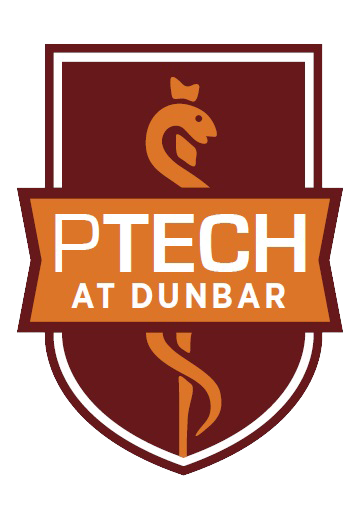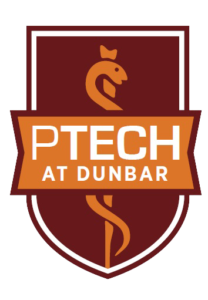THE MISSION AND HISTORY OF P-TECH
P-TECH 9-14 SCHOOL MODEL
P-TECH schools are innovative grade 9 to 14 public schools that create clear pathways from high school to college and career for young people from all academic backgrounds. P-TECH students are not pre-screened for admission. In six years or less, they graduate with a high school diploma and a no-cost, two-year associate degree in a growth industry field. Each P-TECH school works with a corporate partner and a local community college to ensure an up-to-date curriculum that is academically rigorous and economically relevant. Hallmarks of the program include one-on-one mentoring, workplace visits and skills instruction, paid summer internships and first-in-line consideration for job openings with a school’s partnering company.
P-TECH graduates are fully prepared to begin middle-class careers in the 21st century workplace, continue their educations at the four-year college and university level and beyond, or both. By 2016, the replicable and sustainable P-TECH model will encompass a network of more than 60 schools serving thousands of students in the U.S. and Australia. Together, these schools are spearheading an international effort to reform and revitalize career and technical education (CTE).
Why P-TECH Matters
P-TECH matters because current CTE programs are substantially out of sync with the present and future demands of industry. In the U.S. alone, there are 28 million “middle-skill jobs” – jobs that require an associate degree or similar technical training, but not a four-year degree – with 14 million additional jobs coming online by 2018. The fastest growing and highest paying sectors of the job market are those requiring proficiency in STEM (Science, Technology, Engineering, Mathematics) fields. But fewer than one-third of U.S. students are adequately prepared in STEM.
While U.S. high school graduation rates have improved markedly, postsecondary completion rates and the quality of skills training have not. Forty-three percent of U.S. community college students require remediation, and fewer than 25 percent of them will earn their “two-year degree” within eight years. For low-income Americans and young people of color, the statistics are dramatically worse. What awaits them and others without postsecondary degrees and middle-skills job training are part-time, no benefits jobs paying less than $15 per hour (with sporadic or seasonal availability), and the life of the working poor.
P-TECH was designed to help break the cycle of poverty and address skills gaps in the labor force by preparing urban, suburban and rural young people from all backgrounds for academic achievement and skilled, middle-class employment. In 2011, working with the New York City Department of Education and The City University of New York, IBM created a program design that would link education to economic development and illuminate a pathway from high school to college and career.
9-14 Model Tenets and Featured Components
P-TECH is distinct from other “early college” model schools in significant ways:
- P-TECH schools are “open admissions,” meaning there is no testing for admission. P-TECH does not “cream” or “cherry pick” its students.
- As part of a scope and sequence connected to an associate degree in an in-demand STEM field, P-TECH students take full-credit college courses beginning in the summer between grades 9 and 10.
- Each P-TECH school is a collaboration among a school district, a community college and a corporate partner(s) to ensure a rigorous curriculum that maps directly to current and future job market needs.
- Each P-TECH student has a mentor, experiences workplace learning embedded in a strong academic curriculum, and benefits from structured workplace visits and paid internships. Successful graduates are placed first in line for jobs with his or her school’s industry partner.
Focus on Public Schools: P-TECH schools are public schools, open to all students without admissions testing or cost to them or their families.
Focus on Early College: At P-TECH, “college begins in ninth grade.” Students take full-credit college courses as early as the summer between ninth and 10th grades as part of a six-year scope and sequence of academic and workplace learning. Graduates earn their high school diploma and a two-year associate degree from their school’s college partner.
Focus on Careers: As collaborative partnerships among school districts, community colleges and employers, P-TECH programs map their academic and workplace skills curricula directly to 21st century labor market demands. Program curriculum features include:
- Continually sequenced and updated workplace learning informed by current and future industry standards
- One-on-one matching with adult mentors from each school’s partnering company
- Project-based learning activities and experiences, including workplace visits, paid internships and guest speakers from employers
Focus on Mastery Through Personal Pathways: Each P-TECH student moves through a personalized academic and career readiness sequence, aligned to college and career requirements. Teachers and advisors closely monitor each student’s program and progress based on his or her individual needs and performance. The focus is on mastery, not seat time.
The Playbook: www.ptech.org
IBM invented P-TECH, and created the P-TECH 9-14 School Model Playbook website (www.ptech.org) to serve as the central hub for public-private partnerships interested in learning about and implementing this groundbreaking school reform model.
The site details elements of the P-TECH model, and provides action-oriented guidance and tools to enable public-private partnerships to implement the model effectively. The guidance includes a series of P-TECH model schools case studies that illustrate the strategies and tactics required for P-TECH partnerships to replicate the model’s outstanding results.
From the Maryland press release and MSDE RFP document:
The P-TECH (Pathways in Technology Early College High School) education model, co-developed by IBM, is an innovative, nationally recognized approach that blends high school, college, and work experience in one. P-TECH schools offer students an integrated six-year education program that combines high school, college, and workplace skills required for 21st-century jobs. Initially, up to four P-TECH 9-14 schools will launch in Maryland to help better prepare students for college and entry into the job market. Two of the P-TECH schools will be in Baltimore City.
Career pathways begin in 9th grade and provide a seamless and integrated sequence of high school and college study, including a Career and Technology Education (CTE) program sequence and workplace learning. Graduates from Maryland’s P-TECH schools will earn their high school diploma and an industry-recognized, two-year postsecondary degree in STEM (science, technology, engineering, and math) from an accredited community college. These students will also benefit from career experience and mentorship in the workplace and will be first in line for skilled jobs upon graduation through partnerships with private sector participants.
Baltimore City P-TECH Schools
Baltimore City Public Schools System, Baltimore City Community College and employer partners, specifically IBM, Johns Hopkins University, Kaiser Permanente and University of Maryland, Baltimore, are collaborating to develop the resources and staffing necessary to open the first two P-TECH schools in Baltimore City, as part of the initial implementation of the P-TECH 9-14 School Model in the State of Maryland. The district and community college partners will be the same for each school; IBM will serve as the lead industry partner for one school, while Johns Hopkins University, Kaiser Permanente and UMB will join forces to support the second school.
Paul Laurence Dunbar High School #877 1400 Orleans Street, Baltimore, MD 21231
443-642-4478

Copyright © 2023 P-TECH AT DUNBAR | All Rights Reserved.
